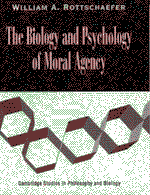Book contents
- Frontmatter
- Contents
- Preface
- Introduction
- PART I MORAL AGENCY AND SCIENTIFIC NATURALISM
- PART II THE BIOLOGICAL BASES OF MORAL AGENCY
- 2 Evolution and morality: Can evolution endow us with moral capacities?
- 3 Evolution and moral agency: Does evolution endow us with moral capacities?
- 4 Developmentally based moral capacities: How does the moral sense develop?
- PART III THE PSYCHOLOGICAL BASES OF MORAL AGENCY
- PART IV A SCIENTIFIC NATURALISTIC ACCOUNT OF MORAL AGENCY
- PART V INTEGRATING A PERSONALISTIC AND NATURALISTIC VIEW OF MORAL AGENCY
- References
- Index
2 - Evolution and morality: Can evolution endow us with moral capacities?
Published online by Cambridge University Press: 19 September 2009
- Frontmatter
- Contents
- Preface
- Introduction
- PART I MORAL AGENCY AND SCIENTIFIC NATURALISM
- PART II THE BIOLOGICAL BASES OF MORAL AGENCY
- 2 Evolution and morality: Can evolution endow us with moral capacities?
- 3 Evolution and moral agency: Does evolution endow us with moral capacities?
- 4 Developmentally based moral capacities: How does the moral sense develop?
- PART III THE PSYCHOLOGICAL BASES OF MORAL AGENCY
- PART IV A SCIENTIFIC NATURALISTIC ACCOUNT OF MORAL AGENCY
- PART V INTEGRATING A PERSONALISTIC AND NATURALISTIC VIEW OF MORAL AGENCY
- References
- Index
Summary
In this chapter and the next, I examine the question of whether humans possess an evolutionarily based moral agency. Assuming that humans are moral agents, I seek to establish that there are biologically based reasons for postulating that humans possess evolutionarily based moral tendencies and capacities as part of a base level of moral agency. In these two chapters, I lay out the grounds for the theoretical plausibility of the claim that humans possess such capacities and tendencies. In Chapter 4, I argue for the existence of one such capacity, the capacity for empathetic distress. Even if these arguments are convincing, their limitations should be obvious. One biologically based moral capacity doth not a base level of moral agency make! However, I think that it is plausible that there are other base-level, evolutionarily founded moral capacities; for instance, for parental care. To develop a reasonable case for the existence of some or all of these moral capacities would be a daunting task. My hope is that I will make a reasonably good case for one such capacity and that, in so doing, I will illustrate the plausibility and the potential fruitfulness of my approach and model.
To establish the theoretical plausibility of evolutionarily based moral capacities I discuss evolutionary theory, since it provides the fundamental basis for biological altruism (Section 2.1), and then present some of the results of sociobiology, because it serves as the proximate theoretical source for an account of biological altruism (Section 2.2).
- Type
- Chapter
- Information
- The Biology and Psychology of Moral Agency , pp. 29 - 51Publisher: Cambridge University PressPrint publication year: 1997



